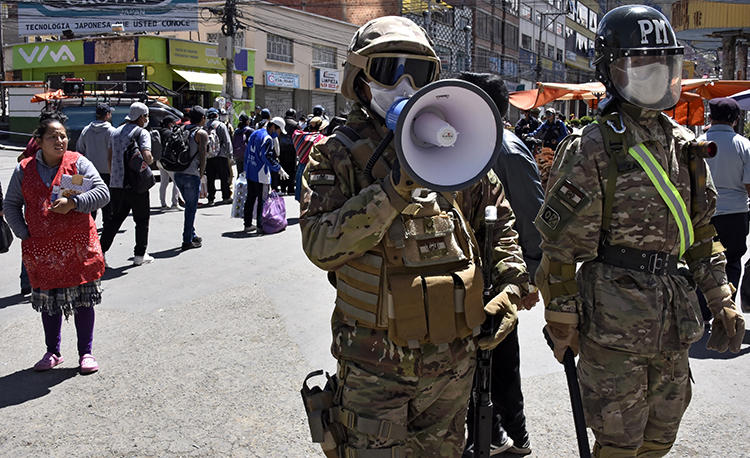Bogotá, April 9, 2020 — Bolivian authorities should reform the country’s lockdown decree to ensure that journalists cannot face jail time for reporting on the COVID-19 pandemic, the Committee to Protect Journalists said today.
On March 25, Bolivian interim President Jeanine Añez signed a decree extending Bolivia’s nationwide COVID-19 lockdown to April 15. Article 13-2 of the decree states that “individuals who incite non-compliance with this decree or misinform or cause uncertainty to the population will be subject to criminal charges for crimes against public health.”
The decree states that violators could face one to 10 years in prison if convicted of violating that article.
“The COVID-19 pandemic must be taken seriously, but vague regulations that criminalize ‘disinformation’ make Bolivia’s interim government look more concerned about its public image than about an effective response to the crisis,” said CPJ Central and South America Program Coordinator Natalie Southwick. “These overly broad provisions that criminalize speech open up the dangerous possibility of abuse against journalists reporting vital information and facts.”
Raúl Peñaranda, editor of the independent Brújula Digital news website, told CPJ in a phone call that he believed the article was aimed at opposition politicians who have allegedly spread rumors and fake news about the coronavirus.
However, Rafael Loayza, dean of the communications faculty at the private Catholic University of Bolivia, told CPJ in a phone interview that the vaguely worded article could be used against reporters by a government that he described as extremely sensitive to criticism.
Añez, who replaced President Evo Morales after his resignation in November and is acting as interim president until national elections slated for later this year, has yet to invoke the article, according to Loayza and Peñaranda.
Speaking with CPJ by phone, Isabel Mercado, the editor of the independent La Paz daily Página Siete, explained that reporters have been overwhelmed covering the coronavirus and the nationwide lockdown, and have not devoted much coverage to the article.
During its five months in power, the Añez interim government has forced several opposition radio stations off the air, harassed critical journalists, and labeled some as “seditious,” according to news reports. In January, Añez’s former communications minister, Roxana Lizárraga, declared that freedom of expression in Bolivia “has its limits.”
“There is a lot of concern among journalists about the government’s relationship with the press,” Loayza told CPJ. “It’s very worrisome.”
